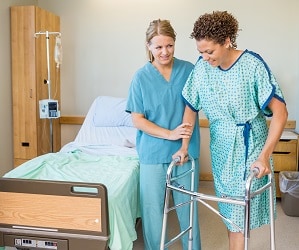Preparing for Surgery
This information will prepare you for surgery. It is important that you read and follow these instructions carefully. If you have any questions or concerns, please call your surgeon’s office.
Testing Before Surgery
Any person who is going to have surgery will be contacted by the Milford Regional Surgery Center and given an appointment for pre-operative testing and instructions for pre-registration. In most cases, this will be a telephone appointment.
Should it be necessary to come to the hospital for pre-operative testing, please park at the Dana-Farber/Brigham and Women's Cancer Center on Route 140. Use the signaled crosswalk to cross Route 140 and follow the walkway to the covered Main Entrance of the Medical Center.
To get to the Surgery Center, enter Milford Regional through the Main Entrance, bear left to elevator A. Take the elevator to the first floor and turn left. The Surgery Center will be down the hall on the right.
Have this information ready for pre-operative testing appointment:
- A list of all your medicines, along with the medicine bottles, including prescription drugs; over-the-counter medicines (i.e. Tylenol, ibuprofen, aspirin, etc.); vitamins; supplements (fish oil, etc.) and herbals. Here is a form you should print, fill out and bring with you to your appointment.
- This list should include what you take, the dose, how often you take it, the time of day, and why you take it.
- A list of any allergies to food, medicines, or the environment (like latex).
- The name and address of your preferred pharmacy.
- A copy of your Health Care Proxy (if you have one). If you do not, here is more information and a Health Care Proxy form for you.
During the telephone appointment:
- A nurse will review your medicines, medical history, what to expect on the day of surgery, and who will be taking you home after your surgery. (For your safety, you will not be allowed to drive or take a cab home alone after surgery, so you will be asked who will be bringing you home.)
- You may be given instructions to come to the hospital for additional testing such as blood-work, X-rays, or an EKG if these are ordered by your surgeon or anesthesia doctor.
- You will be told which medicines to take the morning of surgery.
Getting Ready for Surgery
- Arrange for a ride home. Since you may be sent home earlier or later, make sure your driver can pick you up anytime during the day.
- Prepare your home to make your time after surgery easier. Making meals ahead of time would give you time to rest after surgery.
- Plan for car rides, as you may not be able to drive for a while.
- Arrange for someone to watch your young children, dependent adults, or animals the first few days after surgery.
- Ask an adult to help you after surgery. You may need help changing your bandage, getting food, or taking medicines.
- Surgery is stressful. Stress can affect your ability to manage pain. Use relaxation techniques like deep breathing, positive thinking, or
 visualization to lower your stress.
visualization to lower your stress.
- Quit Smoking. Smoking can increase your risk for infection. Here is helpful information about quitting smoking. You should also talk to your doctor to get information about quitting.
- Avoid drinking alcohol 3-4 weeks before your surgery.
- Call your surgeon if you get a cold, fever, productive cough, or develop open wounds, rashes, or lesions before your surgery. These conditions may increase the risk of surgery and require your surgery to be postponed.
- Write down any questions you have for your surgeon. You will be meeting with him/her before your surgery.
Night before surgery
- Do not eat any food after midnight including candy, mints or gum. Eating may cause your surgery to be cancelled or delayed.
- To reduce the risk of surgical site infection, shower or bathe with a new bar of soap the night before and the morning of surgery. Use a clean washcloth and towel. DO NOT shave body hair near your surgical site.
Day of surgery
Do's!
- Do bring your glasses and a case for storing them. If you must wear contact lenses, bring a case and solution for your lenses.
- Do bring your dentures, hearing aids and cases for storing them
- Do bring something with you to pass time (book, music, etc.)
- Do wear comfortable, clean clothes
- If you were told to take any medicine the morning of surgery, please take it with 4oz (1/2 cup) of water.
Don’ts!
- Do not eat any food on the day of surgery
- Do not have liquids for 4 hours before your surgery
- Do not smoke
- Do not wear makeup, lotions, powders, or perfumes
- Do not wear any jewelry including wedding rings, earrings, or any other body piercing. There are risks of having surgery with body jewelry (metal or plastic) on your body. Please leave all jewelry at home.
At the Medical Center
Our goal is to make surgery safe and less stressful. Waiting can be difficult; we ask patients and family members to please reach out to staff for updates or concerns.
For your safety
 Identify Yourself! You will be asked to tell us your full name and date of birth often.
Identify Yourself! You will be asked to tell us your full name and date of birth often.- Before going to the operating room, you will be asked what surgery you are having. There may be a mark put on your skin or a band put on your wrist to indicate the site/side of surgery.
- Speak Up! If anything you hear or see doesn't seem right to you, say something! Don't be afraid to ask questions.
- Call Don’t Fall! While in the hospital you may be unsteady on your feet. Please call for help before trying to get out of bed.
Preventing infections
- Wash your own hands frequently, watch video

- Do not touch your wound (surgery area).
- Remind your caregivers to wash their hands or use hand sanitizer before they care for you.
- Cover your sneeze or cough with a tissue or your upper arm.
- If you have a catheter after surgery, ask if you still need it.
- Take deep breaths and cough as you were taught. This helps prevent pneumonia.
Preventing blood clots
After surgery, there is a higher risk for blood clots because: you are not moving; you have received anesthesia; and other factors.
- Compression Devices (SCDs) may be put on your lower legs if you are getting general anesthesia. This machine gently squeezes the lower legs, improves blood flow, and prevents blood clots.
 For persons who have a higher risk of blood clots, medicines may be needed to lower the risk.
For persons who have a higher risk of blood clots, medicines may be needed to lower the risk.- If able, get up and walk 6 times each day. Short, frequent walks are helpful. If you must stay in bed, do foot or ankle exercises often.
After Surgery
Relieving Pain
It is normal to have pain after surgery. Controlling your pain is an important step in your recovery. Your caregivers will work closely with you to control your pain.
You will be asked your level of pain often.

- You may be given both narcotic and non-narcotic medicines to control pain. Using both together can help reduce your pain. Less pain allows you to do things that will speed your recovery like deep breathing, coughing, walking, resting, etc.
- Other ways to decrease pain and lower anxiety are: relaxation exercises, meditation, ice packs, heat, or positioning.
- After chest or stomach surgery, holding the surgery area (incision) can help lower your pain when coughing or moving. Gently hold a pillow over the area. Keep the pillow in place with your hands and arms and press gently. Do not hold your breath, when moving or coughing.
- After orthopedic (bone) surgery, raise the area where you had surgery to decrease pain and swelling.
Going home
- The nurse will review what medicines you should take once you are home.
- Unless told otherwise, medicines like Tylenol, Advil, Motrin, or Aleve
 may be taken with or instead of your narcotic medicine.
may be taken with or instead of your narcotic medicine.
- Once home, keep your pain under control. Do this by taking medicine as directed. Do not let the pain get ahead of you. This makes it harder to control the pain.
- Many prescribed pain medicines such as Oxycodone and Hydrocodone can cause severe constipation. To avoid, please drink plenty of fluids and use stool softeners.
- If you received numbing medicine or a 'block', begin taking your pain medicine as soon as you begin to feel sensation in the area.
- If your pain gets worse, in spite of taking all medicines as directed, call your surgeon.
- If able, take short, frequent walks (every hour while awake) in your home.
- Have an adult stay with you at home to help, at least for the first 24 hours.
- Call your doctor or seek immediate medical attention for chest pain; shortness of breath; warmth, tenderness or swelling in legs or arms. These can be signs of a blood clot.
- Preventing infection is very important. Here's some tips:
- Wash hands often and suggest your family and friends do so as well.
- Avoid visitors who have any illness.
- Take care of your surgical site by following your doctor’s instructions.
- Call your surgeon if you have any signs of infection such as fever, redness, drainage, or increased soreness at the surgery site.
Follow up with your surgeon as instructed.
Working together helps lead you to a safe, fast recovery!